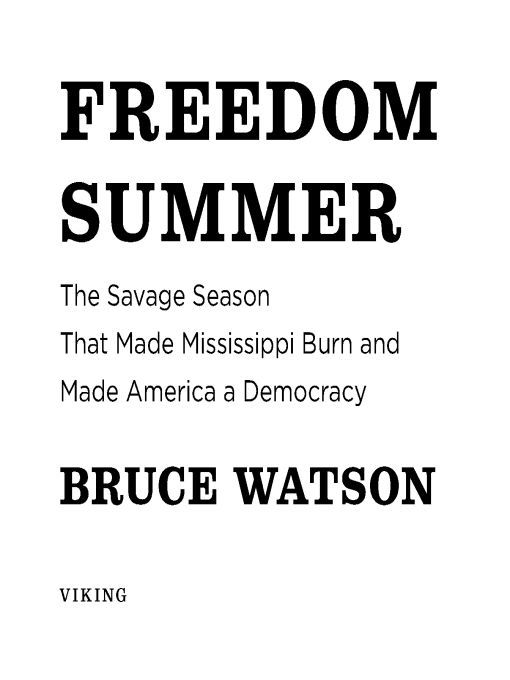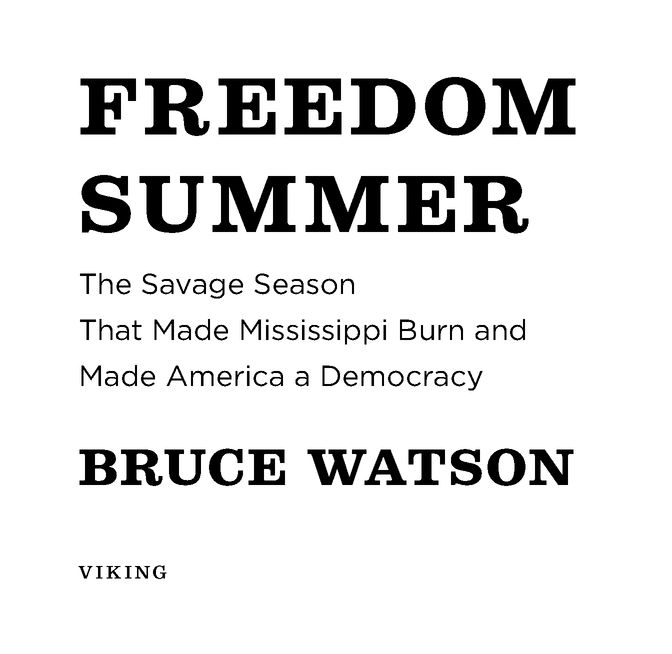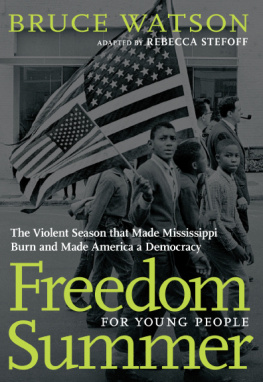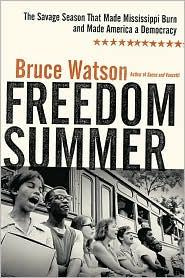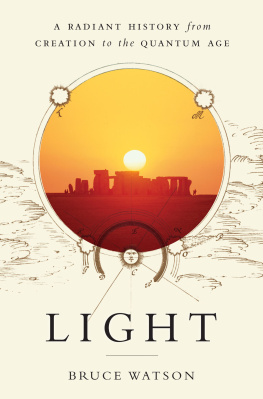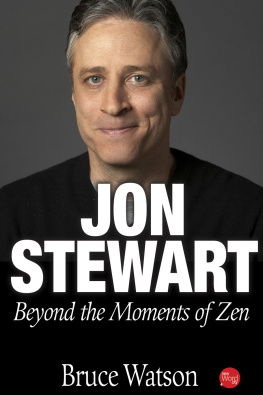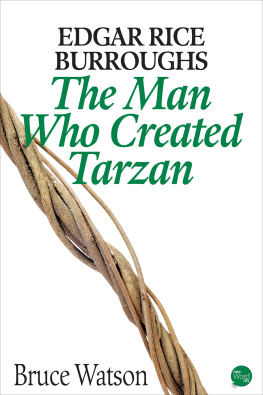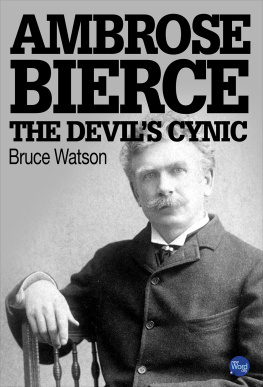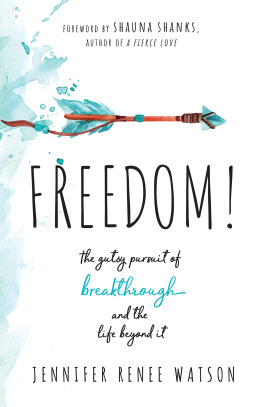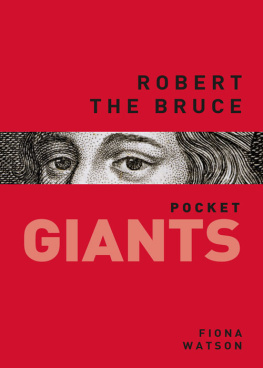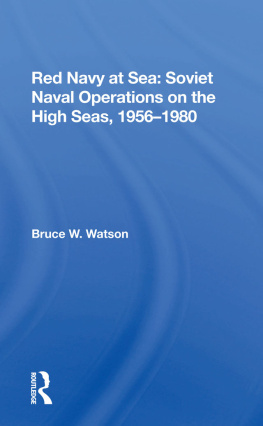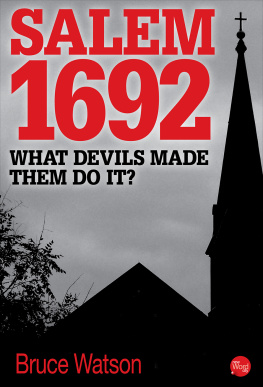Table of Contents
ALSO BY BRUCE WATSON
Sacco and Vanzetti: The Men, the Murders, and the Judgment of Mankind
Bread and Roses: Mills, Migrants, and the Struggle for the American Dream
The Man Who Changed How Boys and Toys Were Made
For all the teachers and the volunteers giving of their time, compassion, and spirit
A dream is not a very safe thing to be near, Bayard. I know;I had one once. Its like a loaded pistol with a hair trigger: ifit stays alive long enough, somebody is going to be hurt. Butif its a good dream, its worth it.
William Faulkner, An Odor of Verbena
By the summer of 1961, Herbert Lee was a wealthy man by local standardslocal black standards. After thirty years of farming in the deepest corner of the Deep South, Lee had a small dairy farm, a modest home, nine children, and a road or two that did not seem like a dead end. So one day that scorching summer, when a young, bespectacled black man from New York showed up on his porch wearing bib overalls and speaking softly about his right to vote, Lee decided he could take a few risks. He agreed to drive the stranger around Amite County. To friends and family, Lees decision suggested a death wish.
Blacks did not vote in Mississippinever had as long as anyone could remember. Niggers down here dont need to vote, one cop said. Aint supposed to vote. Entire counties where black faces far outnumbered white had not a single black voter. Seventy-some years had passed since Mississippi had crafted a clever combination of poll taxes, literacy tests, and other legalistic voodoo that, within a decade, slashed black voting rolls from 190,000 to just 2,000. Ever since, whenever a Negro had dared to register, terror had taken care of him. A trip to the courthouse registrar landed his name in the newspaper. Soon the uppity nigger was beaten, fired, thrown off a plantation, or left trembling in the night by a shotgun fired into his shack. Herbert Lee knew the risks, but when he decided to face them, he did not know he was risking his life.
On the morning of September 25, 1961, Lee was rattling along dusty back roads toward the tiny town of Liberty, Mississippi. Looking in the rearview mirror of his old pickup, he saw a newer truck. Lee pulled into the parking lot of a cotton gin. The other pickup, its tires popping the gravel, pulled alongside. Lee recognized the driver, a burly white man with jug ears and a broad, shiny forehead, pink from the summer sun. Lee had known Mister Hurst all his life, had even played with him as a boy. The two mens farms were not far apart. Perhaps Mister Hurst just wanted to talk. Then Lee spotted the .38 in his neighbors hand.
Through the window of his pickup, Lee shouted, Im not going to talk to you until you put the gun down! Hurst said nothing, just bolted out of his truck. Lee frantically slid across his seat and scrambled out the passenger door. Hurst circled, gun waving.
Im not playing with you this morning! the hulking white man said. Before Lee could run two steps, Hurst put a bullet in his left temple. Lee fell facedown in the gravel. The new pickup sped away. The parking lot fell silent. The body, encircled by onlookers, lay in a pool of blood for hours beneath the sizzling sun. Blacks were afraid to move it, and whites refused.
No one knew how many black men were murdered in Mississippi in 1961. No one could remember the Magnolia State ever convicting a white man of killing a black man. At the coroners inquest, Hurst spun a story about a tire iron Herbert Lee had brandished. His gun, Hurst said, had gone off by accident. A witness was coerced into swearing he saw the tire iron, too, the same one found under Herbert Lees body. State legislator E. H. Hurst never went to trial. But the bullet that killed Herbert Lee set off a string of fire-crackers that clustered in a single summer, a season so radically different, so idealistic, so savage, so daring, that it redefined freedom in America.
BOOK ONE
Crossroads
And the problem of living as a Negro was cold and hard.What was it that made the hate of whites for blacks sosteady, seemingly so woven into the texture of things? Whatkind of life was possible under that hate? How had this hatecome to be?
Richard Wright, Black Boy
Prologue
In the fall of 1963, America was suffused with an unbearable whiteness of being. Confident and assertive, the nation rode an unprecedented wave of prosperity. The engines of the American economy were at full bore; the young, handsome president was well liked and respected. The enemy was unmistakablea mushroom cloud, a bald bully banging his shoe at the United Nations, a worldwide threat that had to be contained. Americans drove two-thirds of the worlds cars and held half the worlds wealth. Cars were big and beefy, with fins, flamboyant taillights, and loud engines under expansive hoods. Jars of Miracle Whip and loaves of Wonder Bread were in most kitchens; Marlboros and Kents were advertised on TV, and half of all adults smoked a pack or more a day. Only one or two cities had enclosed malls. Ninety-nine percent of homes had TVsalmost all black and whiteyet none received more than seven channels. These featured a vast wasteland of Westerns, medical shows, and silly sitcoms. Not a single program showed a dark face in any but the most subservient role. In the halls of Congress and in city halls across the nation, all but a few politicians were as white as the ballots that elected them. Yet from this ivory tower, the future could be spotted.
That fall in Southeast Asia, American advisers sent back discouraging reports, causing President Kennedy to consider ending involvement in Vietnam. College students strummed folk songs, their younger siblings danced to syrupy pop music, but off in England a shaggy-haired rock band was riding a wave of frenzy that would soon sweep across the Atlantic and sweep away old mores. Across the South, blacks were marching into police dogs and fire hoses, demanding decency and human rights. But the most significant signpost in the autumn of 1963 arose in the nations poorest state. There, on a November weekend shortly before events in Dallas began to change everything, thousands of bone-poor citizens gave America a long-overdue lesson in democracy.
Mississippis official ballot listed Republican and Democratic candidates for governor. Yet in a southern state still voting as if Lincoln headed the GOP, the election was never in doubt. Everyone knew Democrat Paul B. Johnson, following in his fathers footsteps, would be the next governor. White voters admired how, as lieutenant governor, Paul Stood Tall Last Fall, blocking a black mans entry to the state university. White voters relished Johnsons sneers at the most hated politicians in Mississippi, Jack and Bobby Kennedy, whose federal troops, so the story went, had incited the integration riots at Ole Miss. White voters sniggered at Johnsons joke that NAACP stood for Niggers, Alligators, Apes, Coons, and Possums. And on November 5, white voters comfortably elected Tall Paul. But that Tuesday, whites were not the only voters in Mississippi.
From the buff sands of the Gulf Coast to the cotton fields of the Delta, a parallel election was held, a black election, a Freedom Election. In little wooden churches with majestic names, whole congregations rose from the pews. While gospel choirs chantedWe-ee shall not, we shall not be movedmen and women slipped Freedom Ballots into wooden boxes. In cafs sweetened by the smell of cornbread, withered hands marked Xs beside Aaron HenryGovernor and Reverend Edwin KingLt. Governor. On teetering porches, black men in overalls and black women in gingham spoke with students from Yale and Stanford recruited for this prelude to Freedom Summer. Nodding politely, calling their clean-cut guests sir, lifelong sharecroppers learned that voting did not have to remain white folks business. And thousands, forging raw democracy out of Mississippis red clay, cast Freedom Votes in beauty parlors and grocery stores, in barbershops and pool halls. Yet thousands more were far too terrified to risk anything so dangerous as voting.

